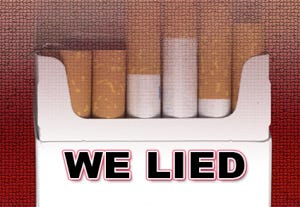Judge orders tobacco companies to admit they've deliberately deceived the American public.

Washington, DC – A federal judge today ordered tobacco companies to admit that they have deliberately deceived the American public and finally tell the truth about their deadly and addictive products and fraudulent marketing. Today's ruling is a critical step toward ending decades of tobacco industry deception that has resulted in millions of premature deaths, untold suffering and billions in health care costs. Requiring the tobacco companies to finally tell the truth is a small price to pay for the devastating consequences of their wrongdoing.
Companies including Altria Group Inc. (MO)’s Philip Morris USA were told by a judge they must publish warnings with their products, in advertisements and on their websites saying they lied to the public about the health hazards of smoking.
U.S. District Judge Gladys Kessler in Washington yesterday ruled on the text of so-called corrective statements proposed by the Justice Department. According to the ruling, one states: “Tobacco companies intentionally designed cigarettes to make them more addictive.” Another says: “All cigarettes cause cancer, lung disease, heart attacks, and premature death.”
The case is USA v. Philip Morris USA, et al, U.S. District Court for the District of Columbia, No. 99-cv-02496.
The statements stem from the government’s 1999 case against the tobacco industry. In 2006, Kessler found the defendants, also including Reynolds American Inc. (RAI)’s R.J. Reynolds Tobacco and Lorillard Inc. (LO)’s Lorillard Tobacco, violated anti- racketeering law by conspiring to hide cigarettes’ risks.
Kessler previously ordered the companies to stop marketing cigarettes as “light” and “low-tar” and to make statements about the health effects of smoking in newspapers and magazines and on materials attached to cigarette packages.
“This court has heeded its mandate to fashion corrective statements that are purely factual and uncontroversial and are directed at preventing and restraining the defendants from deceiving the American public in the future,” Kessler said in yesterday’s 55-page ruling.
Each of the five categories of statements begins with a similar introduction stating that “a federal court has ruled that the defendant tobacco companies deliberately deceived the American public” then says “here is the truth” before going into specifics on the dangers of smoking, health effects of exposure to secondhand smoke, the addictiveness of nicotine and the manipulation of cigarette design and composition.
One statement among those on adverse health effects reads: “More people die every year from smoking than from murder, AIDS, suicide, drugs, car crashes, and alcohol, combined.”
"Requiring the tobacco companies to finally tell the truth is a small price to pay for the devastating consequences of their wrongdoing," said Matthew Myers, president of the Campaign for Tobacco-Free Kids, an anti-tobacco group in Washington.
"These statements do exactly what they should do. They're clear, to the point, easy to understand, no legalese, no scientific jargon, just the facts," said Ellen Vargyas, general counsel for the American Legacy Foundation, which is known for its "Truth" advertising campaign that began in 2000 and was credited with curbing smoking by the young.
The largest cigarette companies in the United States spent $8.05 billion in 2010 to advertise and promote their products, down from $12.5 billion in 2006, according to a report issued in September by the Federal Trade Commission.
The major tobacco companies, which fought having to use words like "deceived" in the statements, citing concern for their rights of free speech, had a muted response.
Yesterday’s ruling didn’t set a deadline for publication. The types of media the companies use to convey commercial messages changed dramatically in the six years since her initial ruling, the judge said. She told the parties to report to her by March 1 on efforts to devise a plan to disseminate the statements.
Some tobacco companies are challenging the FDA law in a separate case. In March, U.S. District Judge Richard Leon blocked the FDA’s requirement that tobacco companies add graphic warning labels to cigarette packages by September 2012. The Obama Administration appealed the ruling. The U.S. Court of Appeals for the District of Columbia Circuit heard that appeal, but has not yet ruled on the case. Any decision is likely to be appealed further, and could end up in the U.S. Supreme Court.
http://www.bloomberg.com/news/2012-11-27/altria-group-corrective-ad-statements-decided-by-u-s-judge.html
http://newsandinsight.thomsonreuters.com/Legal/News/2012/11_-_November/Judge_orders_tobacco_companies_to_admit_deception_publicly/


